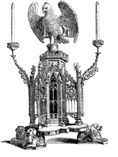
Icons, Relics & Pilgrimages: A Secular Defense
GUEST COLUMN
The veneration of icons and relics finds its origin in human rationality and reason. Yet the secular world disparages this act of piety as irrational, misconstruing icons as idols, veneration as worship, and the miraculous as superstition. This despite everyday life bringing about states of mind indistinguishable from veneration but without evoking the attendant charge of irrationality.
Relics are objects rendered holy by their origin and history. Icons are usually pictorial representations rendered holy by their association with the miraculous. Japanese art historian Akira Akiyama observes that relics are dividable but not duplicable. Icons are duplicable but not dividable. In both cases, value derives not from material composition but from immaterial attributes. The immaterial is recognized as real. This is not some idle speculation but a felt reality — even by people living strictly secular lives.
By way of example, in the early 1990s, a Leeds property developer paid £100,000 for a painting entitled Nude, 1909-10 by Marc Chagall. The provenance was not impeccable, but the painting did appear in the 1989 book Chagall: The Russian Years 1907-1922 by Aleksandr Kamensky, a friend of Chagall. Two decades later, the developer became concerned when a subsequent reprinting of Kamensky’s book omitted the painting he had purchased. Based on provenance, connoisseurship, and forensic analysis, the painting was determined to be a fake. Taking inflation into consideration, the value of the painting dropped from the equivalent today of £237,070 ($301,900) to zero. Why? The painting itself had not changed.
You May Also Enjoy
Arguing that the Novus Ordo Missae is substantively different from the old Mass is not easy, even as it is plain that something is very different between the new rite and the old.
Good liturgy involves good taste, and, as Burke said, taste depends on rational judgment, emotional maturity, and education — that is to say, the virtues.
Regarding religious observance, obligation is a large part of the act itself, and the benefit. Both having the obligation and meeting it form us.

